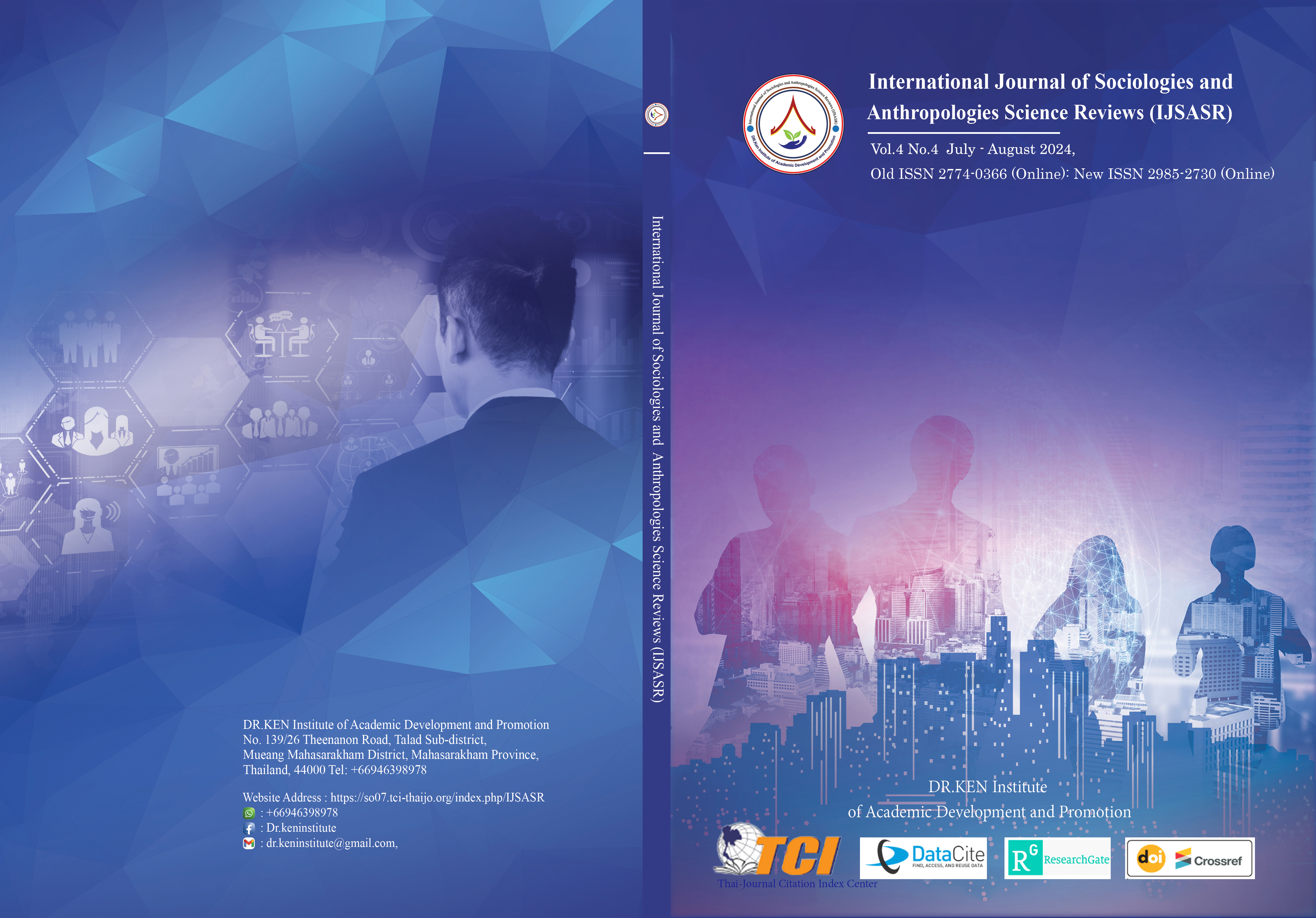An Empirical Study of Mythware Platform on Improving Academic Performance of College Students
Main Article Content
Abstract
Background and Aim: With the rapid development of science and technology, great changes are taking place in education all over the world. Digital education is a trend that is forcing the digital transformation of education in different countries, and the education sector is gradually embracing digital games, apps, websites, social media, and learning environments. The research aims to investigate the impact of integrating the Mythware system and task-based pedagogy on academic performance in new media design courses.
Materials and Methods: This quasi-experimental study aims to investigate the impact of integrating the Mythware system and task-based pedagogy in a new media design course for second and third-year students at the School of Computer at Guangdong Business and Technology University. The study includes 92 students divided into experimental and control groups, with data collected through pre and post-tests to assess academic performance. SPSS software will be used for data analysis, including an independent sample T-test to evaluate the effectiveness of the experimental intervention on student outcomes.
Results: The scores of students in the experimental group were significantly improved before and after the experiment, which proves that the Mythware platform can improve the academic performance of college students.
Conclusion: The results show that the experimental group of students before and after the experiment in the practical, spiritual, aesthetic, cultural, and innovative aspects of the assessment scores have significantly improved. The results of the T-test also confirmed that the experimental group of students in these dimensions of the post-test scores are significantly higher than the pre-test.
Article Details

This work is licensed under a Creative Commons Attribution-NonCommercial-NoDerivatives 4.0 International License.
Copyright on any article in the International Journal of Sociologies and Anthropologies Science Reviews is retained by the author(s) under the under the Creative Commons Attribution-NonCommercial-NoDerivatives 4.0 International License. Permission to use text, content, images, etc. of publication. Any user to read, download, copy, distribute, print, search, or link to the full texts of articles, crawl them for indexing, pass them as data to software, or use them for any other lawful purpose. But do not use it for commercial use or with the intent to benefit any business.

References
Afasizhev, M.N., Jestetika, K., & Afasizhev, M.H. (1975). Aesthetics Kant. Retrieved from: https://www.biblio.com/book/afasizhev-mn-jestetika-kanta-afasizhev-mh/d/1322013666
Alber, S. M. (2010). A Toolkit for Action Research. In Rowman & Littlefield Publishers, Inc. Rowman & Littlefield Publishers, Inc.
Barth, M., & Burandt, S. (2013). Adding the “e-” to Learning for Sustainable Development: Challenges and Innovation. Sustainability, 5(6), 2609–2622. https://doi.org/10.3390/su5062609
Calhoun, E.F. (1994). How To Use Action Research in the Self-Renewing School. Association for Supervision and Curriculum Development, 1250 N.
Cohen, L., Manion, L., & Morrison, K. (2017). Research Methods in Education. Retrieved from: https://sc.panda321.com/extdomains/books.google.com/books/about/Research_Methods_in_Education.html?hl=zh-CN&id=9mYPEAAAQBAJ
DANE. (2019). Boletín técnico Encuesta de desarrollo e innovación tecnológica (EDIT) Industria manufacturera 2017-2018. Retrieved from: https://www.dane.gov.co/index.php/estadisticas-por-tema/tecnologia-e-innovacion/encuesta-de-desarrollo-e-innovacion-tecnologica-edit/informacion-historica-edit
Decuypere, M., & Vanden Broeck, P. (2020). Time and educational (re-)forms—Inquiring the temporal dimension of education. Educational Philosophy and Theory, 52(6), 602–612. https://doi.org/10.1080/00131857.2020.1716449
Decuypere, M., Grimaldi, E., & Landri, P. (2021). Introduction: Critical studies of digital education platforms. Critical Studies in Education, 62(1), 1–16. https://doi.org/10.1080/17508487.2020.1866050
Gray, T., & Bunte, J. (2022). The Effect of Grades on Student Performance: Evidence from a Quasi-Experiment. College Teaching, 70(1), 15–28. https://doi.org/10.1080/87567555.2020.1865865
Julier, G. (2006). From Visual Culture to Design Culture. Design Issues, 22(1), 64–76.
Kanta, J.I. (1991). Jestetika Immanuila Kanta i sovremennost’. Retrieved from: https://baike.baidu.com/item/伊曼努尔·康德/2631177?fromModule=lemma_search-box&fromid=5618&fromtitle=康德.
Kemmis, S., McTaggart, R., & Nixon, R. (2014). The Action Research Planner: Doing Critical Participatory Action Research. Springer Singapore. https://doi.org/10.1007/978-981-4560-67-2
Lewis, S. (2021). The turn towards policy mobilities and the theoretical-methodological implications for policy sociology. Critical Studies in Education, 62(3), 322–337. https://doi.org/10.1080/17508487.2020.1808499
Mâță, L., Clipa, O., & Tzafilkou, K. (2020). The development and validation of a scale to measure university teachers’ attitudes towards the ethical use of information technology for a sustainable education. Sustainability, 12(15), 6268.
Merriam-Webster Dictionary. (1974). New York: Pocket Books. New York: Pocket Books. http://www.etsy.com/market/pocket_books_new_york
Narbasheva, M.A. (2021). The importance of pedagogical and psychological literacy of parents in preparing children for school education. AN INTERNATIONAL MULTIDISCIPLINARY RESEARCH JOURNAL, 11(1), 728–732. https://doi.org/10.5958/2249-7137.2021.00099.9
Negi, J.S. (2016). Improving Teaching through Action Research; Perceptions, Practices, and Problems (3Ps): Voices from Secondary Level Teachers in an EFL Context. ELT Voices. ELT Voices- International Journal for Teachers of English. Retrieved from: https://www.academia.edu/43513896/Improving_Teaching_through_Action_Research_Perceptions_Practices_and_Problems_3Ps_Voices_from_Sec_ondary_Level_Teachers_in_an_EFL_Context_ELT_Voices
O’Leary, Z. (2004). The Essential Guide to Doing Research. Retrieved from: https://sc.panda321.com/extdomains/books.google.com/books/about/The_Essential_Guide_to_Doing_Research.html?hl=zh-CN&id=D1ZWS2Wnk2QC
Parallel forum on ‘Digital Transformation and Development of Vocational Education’—Government portal of Ministry of Education of the People’s Republic of China. (2023, February 14). Retrieved from: http://www.moe.gov.cn/jyb_xwfb/xw_zt/moe_357/2023/2023_zt01/yw/202302/t20230214_1044721.html
Patent Examination Guidelines. (2023). Part 2—Section 5—Practicality. Retrieved from: http://www.cypatent.com/cn/sczn2-5.htm
Sagor, R. (1992). How To Conduct Collaborative Action Research. Association for Supervision and Curriculum Development, 1250 N.
School Profile. (2023). Guangdong Business and Technology University. Retrieved from: http://www.gdbtu.edu.cn/contents/257/34.html
Williamson, B., Eynon, R., & Potter, J. (2020). Pandemic politics, pedagogies, and practices: Digital technologies and distance education during the coronavirus emergency. Learning, Media and Technology, 45(2), 107–114. https://doi.org/10.1080/17439884.2020.1761641
Xue, Y., Gu, C., Wu, J., Dai, D.Y., Mu, X., & Zhou, Z. (2020). The Effects of Extrinsic Motivation on Scientific and Artistic Creativity among Middle School Students. The Journal of Creative Behavior, 54(1), 37–50. https://doi.org/10.1002/jocb.239
Zhuo, L., & Qi-Xian, G. (2015). The Application of Hybrid Flipped Classroom in the Course of Java Programming. 2015 7th International Conference on Information Technology in Medicine and Education (ITME), 637–641. https://doi.org/10.1109/ITME.2015.95
Шаббазова, Д. Р. (2018). ВОСПИТАНИЕ ТРУДОВОЙ АКТИВНОСТИ ПРИУЧЕНИЕ К ТВОРЧЕСТВУ. Гуманитарный Трактат, 25, 99–102.






